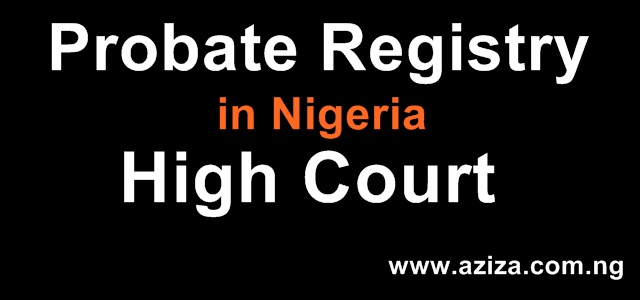The Probate Registry in different state courts in Nigeria may differs in one way or the other but, the most common thing about all is, it is where to obtain legal instruments to facilitate the legal administration and management will, estates, etc. It is an effective channel of dispensing justice in matters of testacy and intestacy. Such activities include registering of will, obtaining letters of administration and grant of probate and all other related matters.
The Probate Registry is usually located within the High Court premises of most states and the following are its usual functions in the administration of justice:
FUNCTIONS OF THE PROBATE REGISTRY
The functions of the probate registry are better appreciated under the following circumstances:
- Registering of WILL
- When death benefits or pension funds need to be accessed by a deceased person’s beneficiaries/relatives.
- When legal title to landed property and buildings is required to be obtained by a deceased person’s beneficiaries/relatives.
- When there is a need to partition/distribute a deceased person’s estate amongst the beneficiaries/family members.
Read: How to write a valid Will in Nigeria
Registering of Will in Nigeria
One of the key things that makes a will a valid one in Nigeria is when it is registered with Probate Registry. Probate Registry will have a copy of the will registered. This serve as main backup in event where there is doubts.
One of the functions of the Probate Registry is the custody of Wills. After a Will has been prepared by a Testator by himself/herself or by his/her Solicitor, it must be lodged at the probate registry of the High Court of the State upon the payment of the prescribed fee.
Testate Administration
Upon the death of a Testator who lodged a Will at the Probate Registry during his/her lifetime, the probate registry is usually the first port of call after the burial of the Testator. The Probate Registry is charged with the duty of issuing a grant of probate to a deceased person’s Will. This grant of probate is the legal instrument which provides the legal basis for the enforcement of the contents of the Will. The application forms for the grant of probate consist of the following:
- Bank certificate
- Application for grant of probate of the Will
- Oath for Executor/s
- Affidavit of attesting witness of the Will
- Inventory of assets
- Particulars of leasehold/freehold properties left by the deceased
- Schedule of debts and funeral expenses
After the Executors have filled and signed the forms, they or their appointed solicitor returns the forms to the probate registry with accompanying documents. It usually takes a minimum of 2 to 3 months for the application to be processed and approved by the appointed Probate Judge depending on whether or not properties are listed as assets of the estate in the application form. Where property/ies is/are included in the list of assets, the Valuation Unit of the Registry shall be required to conduct an inspection of the property/ies for the purpose of ascribing a value thereto and this may extend the time for processing the application by an additional 3 to 5 weeks.
Read: Certificates and Permits for Oil & Gas Business Required in Nigeria
Intestate Administration
The procedure outlined above also applies to intestate administration. However, the difference with intestate administration is that the deceased person did not write a Will to guide the administration of his/her estate. Under such circumstances, the family reaches an agreement on whom the personal representatives/administrators of the estate should be and the nominated administrators take on the role of the executors of the estate by applying for the letters of administration which play the same role as a grant of probate.
It is important to note that not just anyone can apply for the letters of administration. The Probate Registry usually gives consideration to the provisions of the Law which states the order of distribution of an intestate’s assets with the spouse and children of the deceased person as first in line. This will be considered by the Probate Registrar before the confirmation of the administrators upon issuance of the letters of administration.
Under an application for letters of administration, there is a procedure for the publication of the estate where the details of the Estate such as the names and addresses of the proposed administrators to the estate are published against the name of the deceased person. It serves as a notice to all interested parties that the administration of the estate will be granted to the appointed administrators in the absence of any opposition.
The application forms for letters of administration consist of the following:
- Bank certificate
- Application for letters of administration (without Will)
- Oath for Administration (without Will)
- Administration Bond (without Will)
- Declaration as to next of kin form
- Inventory of assets form
- Particulars of freehold/leasehold properties left by the deceased
- Schedule of debts and funeral expenses
It usually takes an average of 4 to 6 months to obtain letters of administration in Lagos State once the forms have been properly filled and returned with accompanying documents/requirements to the probate registry and barring bureaucratic delays.
Click to Contact a Law Firm in Nigeria

